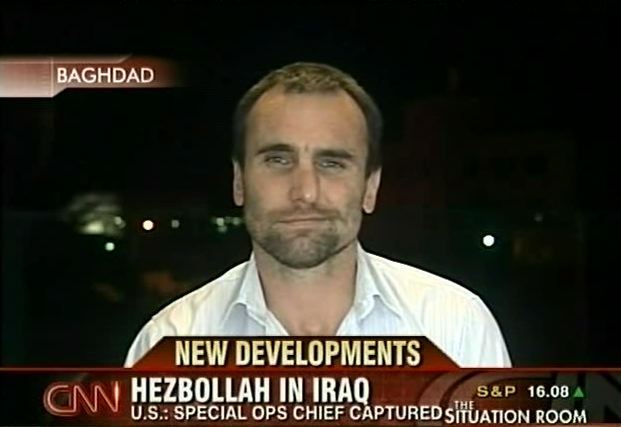TSR: "the hazy ether of the cloak and dagger world of this war"

Click photo to play
Length: 4:53
SUZANNE MALVEAUX: U.S. officials say the arrest of a top Hezbollah special operations officer has yielded evidence at last of something they had suspected all along -- a new foreign terror threat in Iraq.
What does the new information mean for the coalition's mission in Iraq?
Michael Ware now joining us from Baghdad.
Thank you so much.
Now, we have heard about Al Qaeda in Iraq. We've also heard about Sunni insurgents and Shia militia.
You have now broken the story that there are Hezbollah now inside of Iraq.
Tell us about their presence and what kind of operations are you seeing.
MICHAEL WARE, CNN CORRESPONDENT: Well, right now, Suzanne, the presence of Lebanese Hezbollah inside Iraq is unquantifiable. Obviously, this is happening out there in the hazy ether of the cloak and dagger world of this war. These are men who are well trained in the tradecraft of espionage and spying and not being found.
But what the U.S. military is saying is that based on what they've learned from their arrest of a senior Lebanese Hezbollah special operations commander here in Iraq, is that Hezbollah is doing a number of things.
Firstly, they're here in an advisory capacity. The U.S. military says they know for a fact that Hezbollah is helping train Iraqi paramilitaries inside Iran. What's long been rumored but never proven until now, is that they're actually crossing the border with some of these paramilitaries and guiding and training and assisting their operations.
Now, those operations are part of a broad program and include the use of deadly roadside bombs known as the EFP, or explosively formed projectile that punches through American battle tanks with ease. Kidnapping -- just like Hezbollah kidnapped Israeli soldiers to spark the Lebanese war, we can -- the U.S. military can link this commander to the attempted kidnap of five American soldiers in January, which unfortunately ended with their deaths.
So Hezbollah is part of a broad-ranging program run by Iran focused on these anti-coalition activities.
MALVEAUX: So, Michael, let's talk about the strength of Hezbollah. You're saying, obviously, they have the support of the Iranians.
We saw, of course, in Lebanon the fighting taking on the Israelis, essential beating them in that war.
What do you think that they are capable of doing to American soldiers in Iraq?
WARE: Well, they're eminently capable of making an impact, particularly at this crucial time. Now, we know this fellow has been in and out of Iraq for over a year -- for about a year before he was captured. So -- and it's long been said that their presence predates that.
What we know is that they're small in number, but these are the masters of guerrilla warfare in this region -- trained by the Iranians, but hardened in the fires of battle against the Israelis. They're experts in this particular type of Iranian roadside bomb that's having such an impact here. They're experts in the kind of operations Iran wants its Iraqi proxy paramilitaries to carry out.
And essentially what Iran is doing is trying to put the pressure on America. It knows the domestic timetable. It knows General Petraeus is going to face Congress in September. So it wants to skew his figures for that as much as possible. Their foot is on the accelerator -- Suzanne.
MALVEAUX: And, Michael, let's talk about that deadline, that assessment in September.
As you know, General Petraeus and others are going to be looking at that.
From what you can tell, in two months or so, what do you think that so-called U.S. surge is going to produce?
WARE: Well, it's really, truly a mixed bag. Certainly in some areas, the figures are down. For example, according to the Ministry of Interior here in Iraq, albeit a less than a reliable source in the past, it has accounted that civilian deaths this month are the lowest they've been all year -- 700 down on last month; just over 1,200 this month, down from 1,900 last month. That's a good figure.
But American deaths, for example, continue to stay high, hitting triple figures. So we're not seeing any dip in that.
Now, the Americans would say that's because our boys are in the field and they're in the line of fire. But that's also because, according to the second most powerful general here in Iraq, as Lieutenant General Odierno said, our enemies are surging, as well. So they're trying to dilute the results.
At the end of the day, General Petraeus is going to have a big mix of conflicting data. He's going to have a host of conflicting opinions coming at him from everywhere. And when he goes back to tell America what's possible, he's really going to have to go on his gut. He's not going to deliver a miracle. The best he can say is, "We see signs it could work, give us more time."
MALVEAUX: Okay, Michael Ware, thank you so much, from Baghdad, joining us here in THE SITUATION ROOM.
WARE: Thanks, Suzanne.
